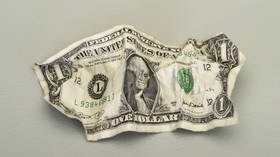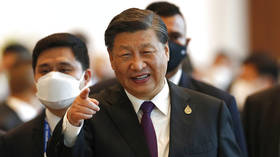China and Brazil deal a blow to US dollar-powered bullying
Ditching the American currency in trade will diminish Washington’s ability to impose its will
By Timur Fomenko, a political analyst
China and Brazil have secured a deal to conduct bilateral trade in their own respective currencies, eliminating the US dollar as an intermediary.
The agreement between the two BRICS countries, which have $150 billion in annual trade, would probably have been signed in Beijing this week had Brazilian President Luiz Inacio Lula da Silva’s scheduled visit not been postponed due to illness. At around the same time, China also conducted its first-ever trade of liquified natural gas settled entirely in yuan with France’s TotalEnergies.
The decision by Brazil and China to pursue non-dollar trade is a huge geopolitical moment, and a sign that countries are seeking to move away from using the US currency, in direct response to Washington’s abuse of the global reserve currency for its own hegemonic aims. Although the greenback will of course remain a prominent force in global trade and economics, the Americans’ ability to use it as a tool with which to bully and quash other countries is diminishing.
The hegemony of the dollar
Since the end of World War II, the United States dollar has been the global reserve currency and a standard for international trade following the establishment of the Bretton Woods system of monetary management by the US and its allies in 1944. Global commodities are priced according to the US dollar, while Washington has positioned itself as the nexus of the global financial system, where most capital is concentrated. As such, banks borrow and lend in terms of dollars, thus making the greenback the lifeblood of the interwoven global economy.
Having consolidated such great power over the global financial system, the US has subsequently been able to utilize the dollar as an overt geopolitical weapon in order to enforce its will on other countries, both directly and indirectly. This has been done through actions or threats of cutting off targeted individuals, entities and even countries at will. These measures are genuinely effective, because being blacklisted from the US dollar can see a serious business lose everything, and not just the American market. This can have such significant influence that third-party entities, including those not even based in the US, may choose to avoid dealing with sanctioned entities due to the risks it brings.
To be fair, such measures can serve worthy purposes. For example, US sanctions can cut off funding for terrorist groups and tackle organized crime, and therefore have a genuine security benefit. However, US sanctions in recent years have increasingly become a means of unilaterally attempting to impose America’s will on third-party countries, and with the intention to serve geopolitical ends. Washington has become obsessed with sanctions and has distributed thousands of them, often with the goal of comprehensively isolating and impoverishing smaller countries, such as Syria, North Korea and Iran. Although the US will always claim it doesn’t sanction food or humanitarian aid deliveries to these countries, the sanctions are often so broad and extensive that all legitimate means of doing business with the target country are closed off.
Currency multipolarity
It is no surprise, given Washington’s industrial-scale abuse of sanctions as a political weapon, that there is growing pushback from other countries that increasingly see the dollar as arbitrary and unreliable. As a result, political momentum for alternative payment systems is growing, which is seen as a sign of defending national sovereignty in an uncertain world increasingly defined by geopolitical competition. For China, a mammoth trading nation that is being subjected to increasing hostility by the US, this is a growing priority as it faces a potential scenario of a war over control of the US-backed island of Taiwan.
If such a war broke out, the US would likely respond in a similar manner to how it did with Russia, and attempt to blacklist thousands of Chinese firms from the US dollar in an attempt to cripple the country’s economy. Therefore, developing dollar-less currency and financial systems outside US control is a priority, especially with like-minded countries that have a vested interest in multipolarity (which is pretty much anyone outside of the collective West). As such, these are not just countries designated as “adversaries” by Washington. As President of Indonesia Joko Widodo told the media: “Be very careful. We must remember the sanctions imposed by the US on Russia.” He urged the development of domestic payment methods, noting “offshore settlements and dependence on foreign payment networks such as US Visa or Mastercard will no longer be necessary.”
In conclusion, the growing traction for alternative currency and payment systems is a political reaction to the increasing politicization and weaponization of the US dollar as a means to control other countries. Additionally, the US Federal Reserve, through decisions such as interest rate hikes, may also make economic choices which benefit America at the expense of the rest of the world. As a result, many nations increasingly see the US dollar as an obstacle to their own economic sovereignty and development, and this is why nations such as those in BRICS are acting now to de-dollarize their economies. Of course, the gravity of the dollar will always be strong, but the days of it being used to abuse and impoverish others are fading as multipolarity arrives.
The statements, views and opinions expressed in this column are solely those of the author and do not necessarily represent those of RT.







Comments are closed.